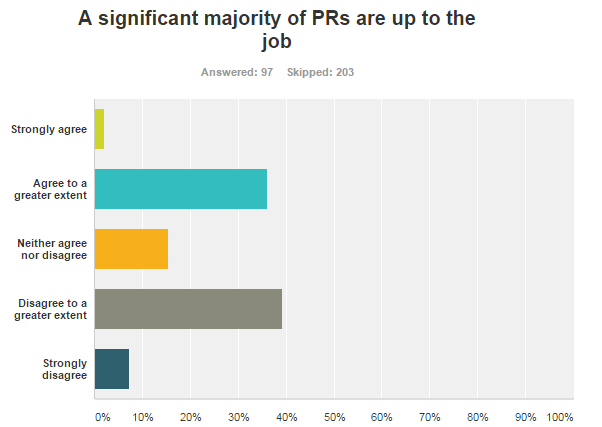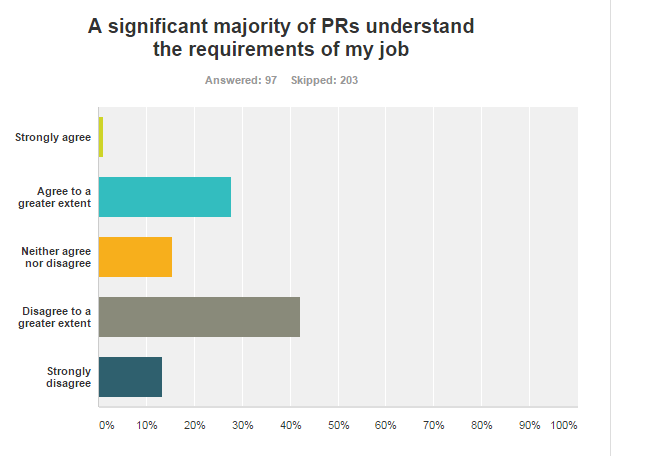
Nearly half the journalists questioned in a Press Gazette/PR Week survey said a “significant majority” of the PRs they deal with are not up to the job.
This was one of the findings of a piece of research conducted by PR Week and Press Gazette asking UK media professionals on either side of the fence what they think about each other and themselves.
Some 300 responded to the survey: 205 PRs and 95 journalists.
Asked whether they agreed with the statement: “A significant majority of PRs are up to the job”, some 46 per cent of journalist respondents said they disagreed.
When PRs were asked the same question, only 8 per cent said they thought a significant majority of journalists were not up to the job.
The gripes listed by journalists about PRs included the following:
- “As a journalist I find that most PR agents just send out press releases. It is often difficult to obtain additional information or to verify things further.”
- “Lots do not know what makes a news story, omit essential information. Send releases in claiming to be news when they are weeks old… Many just get names from media directories and essentially spam irrelevant titles, not only by email but then with totally unnecessary follow up calls asking ‘did you get my email’.”
- “Language in releases is frequently indecipherable marketing bullshit dutifully reproduced to please the client without any thought of the end reader or recipient.”
- “I must get 10 irrelevant calls a day and many more emails that are deleted without opening. There are a few notable exceptions of very good, helpful responsive PRs but they are becoming fewer and further between. PR function is sometimes lumped in with marketing and handed to people who are barely literate.”
- “There seems to be a 50/50 split between the truly wonderful ones, and the ones that have no clue what they’re doing!”
- “Many of them can’t even write English – and by that I don’t mean they’re foreign, they simply don’t have a grasp of basic grammar and/or spelling.”
- “As far as tech PRs is concerned, the majority of PR contact is poorly-conceived, badly written or worded and lacks any sense of how journalists will consume the material.”
- “Many public sector press officers seem to believe that Government, police, etc should be able to operate in total secrecy and are aggrieved by the idea of journalists asking for information, requesting answers to uncomfortable questions.”
- “The gap between average and superb in UK PR is absolutely vast. The few who do it well are often sector specialists who have spent years getting to know journalists and thinking creatively about how to do a long-term job for their clients.”
- “I receive a fair amount of calls from PRs who have no idea what the magazine/website I worked on is about.”
- “The number of PRs seems to be rising who a) fail to target releases appropriately, b) send the release as an attachment, c) send a batch of unsolicited photos that use up data on a mobile to download – just ask if we want pics or send a link to Dropbox!, d) send event invitations at short notice without even checking that you live outside London and when it’s obvious you’re only being asked to make up the numbers so as not to disappoint the client, e) fail to get my name right, f) don’t give you an unsubscribe option on their emails and f2) kick up a huge fuss when you email to ask them to take you off their mailing list (and sometimes blame it on Gorkana – sorry, but we know when you’re lying).”
- “I deal pretty much exclusively with PR agencies representing companies and corporations. There is a tendency to employ (without wishing to sound sexist) young female graduates who are just plain ditsy, inexperienced in both life and work and who don’t have a clue what to say once thrown off their ‘script’ when pitching stories to me.”
- “They think their job is to gate keep and to pester journalists, not to facilitate the communication of information from their organisation to the wider world.”
The survey also invited PRs to reveal what they dislike about journalists:
- “Being rude about PRs who are just trying to do their job.”
- “A misguided belief that every public body is lying to them.”
- “When they want a comment at all costs and become rude and bullying.”
- “Some, typically London based, who have no idea about geography outside the M25 area.”
- “Very few journalists actually are independent. Commercial concerns are too powerful.”
- “Using FOI before asking me for info first!”
- “Poor time keeping/lack of respect for other people’s time.”
- “Just saying ‘send it through’ before you get a chance to pitch when you’ve specifically targeted it towards them or their publication, genuinely believing it would be a great fit.
- “Never pick up the phone!”
- “Poor communication. I know that journalists have never been under greater pressures with their workload/volume of media enquiries. But, when we spend a lot of time researching a journalist opportunity, craft a tailored pitch, it would be great to have some acknowledgement that they received it, and an indication of whether they are going to run or not.”
- “Local journalists who think they are the Second Coming but who don’t fact check – PLEASE just email me & ask, it’s my actual job to help you.”
- “When they can’t even muster the basic decency to be polite (succinct, concise is fine) on the phone.”
- “Journalists who bitch about PRs and how lazy and worthless they are – who then turn around and throw a strop because they don’t get free Wimbledon tickets from your brand.”
Some 53 per cent of journalist respondents agreed with the statement “I believe PR is a difficult job” versus 80 per cent of PRs who think journalism is a difficult job.
Some 38 per cent of PR respondents said they had previously worked as journalists.
The survey also found that journalists and PRs both appear to enjoy their jobs, but PRs are more satisfied with the amount they are paid.
Asked how much they enjoyed their jobs on a scale of one to 10, 90 per cent of journalist respondents gave a score of seven or more.
On the same question, some 86 per cent of PR industry respondents gave a score of seven or more.
On the question of money, 69 per cent of PRs said believe they are paid an appropriate amount for the job they do.
For journalists, 29 per cent agreed with the statement that they are paid appropriately for the job they do.
Asked whether PRs understand the requirements of their job, most journalists (56 per cent) said they didn’t.

Some 80 per cent of journalist respondents said a significant majority of PRs treat them in a police and respectful manner.
For PRs, the proportion answering yes to this question fell to 73 per cent.
Email pged@pressgazette.co.uk to point out mistakes, provide story tips or send in a letter for publication on our "Letters Page" blog
